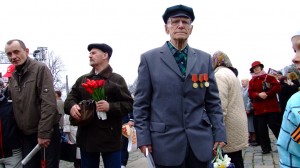
Riga Mayor Nils Ušakovs, himself an ethnic Russian, gave a speech at the Uzvaras Park celebration apologizing to Red Army veterans for a lack of appreciation for their wartime sacrifices in independent Latvia. Photo used courtesy of Baltic Features.
RIGA — Old Town was eerily quiet during most of Sunday, as much of the Latvian capital’s Russian population was on the other side of the Daugava River in Uzvaras Park celebrating the 65th anniversary of the Soviet Union’s victory over Nazi Germany in World War II.
An estimated 100,000 people attended the May 9 event according to Latvia State Police, who said the always controversial anniversary generated little violence and only 29 arrests/cautions mostly for public drunkenness.
In the park there were day-long concerts and in the evening a massive fireworks show, paid for by the municipal government of Moscow. Meanwhile on roads throughout Latvia cars decked out with Russian ensigns cruised with drivers honking horns and singing. Sunday’s rally boasted the biggest attendance for the event since independence, with its popularity ballooning in the last few years.
Riga Mayor Nils Ušakovs, himself an ethnic Russian, gave a speech at the event apologizing to Red Army veterans for a lack of appreciation for their wartime sacrifices in independent Latvia. In the past Ušakovs has said that he does not consider the incorporation of the Baltic states into the Soviet Union as an occupation, echoing the Russian government’s stance.
Painful past
The anniversary highlights a perennial source of tension between Latvia’s ethnic Russians and ethnic Latvians.
“History is one of the most divisive issues in the Baltic states,” Nils Muižnieks, a professor at the University of Latvia, told AFP.
PHOTO GALLERY
Ethnic Russians tend to view the defeat of the Nazis as a liberation of Eastern Europe from fascism, but Balts see it as a reoccupation of their countries by the Soviet Union.
Russia officially disputes that the Baltic states were ever occupied, calling their absorption into the Soviet Union legitimate, something that has always soured relations between the three countries and their large Eastern neighbor. The violent resistance movements and so-called genocide highlighted by the post-Soviet Baltic governments only exacerbate this disagreement.
The attendance of the Estonian and Latvian presidents at Moscow’s May 9 celebration, along with other world leaders, is considered a step toward rapprochement between the former foes.
FOOTAGE OF THE MAY 9 FIREWORKS SHOW
The recent acknowledgment by Russian President Dmitry Medvedev of the Soviet Union’s repressive system and the evils of dictator Joseph Stalin, after years of revisionism of the dark side of Soviet rule by the Putin administration, was welcomed by the Baltic governments, though.
“The Soviet Union was a very complicated state and if we speak honestly the regime that was built in the Soviet Union… cannot be called anything other than totalitarian,” Medvedev said. “Unfortunately, this was a regime where elementary rights and freedoms were suppressed.”
“Despite the fact that [Stalin] worked a lot, and despite the fact that under his leadership the country recorded many successes, what was done to his own people cannot be forgiven,” Medvedev said.
Newly-appointed Latvian foreign minister Aivis Ronis called Medvedev’s statement a step in the right direction.
”This is a step forward, and the Russian president is close to reiterating our interpretation of our history,” Ronis said at a press conference Friday.
This article is free to view. To read Baltic Reports’ subscription-only articles, click here.












